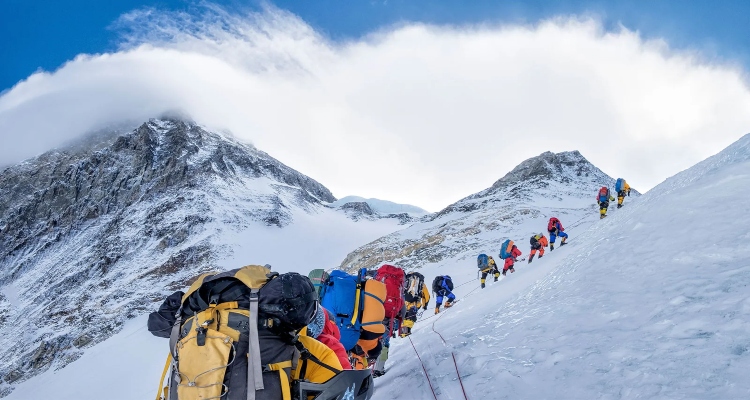
The Nepal Supreme Court has issued a mandamus to the government of Nepal, directing it to impose a limit on the number of climbing permits for peaks in Nepal, including Mount Everest.
A bench comprising Justices Sapana Pradhan Malla and Sushma Lata Mathema issued a mandamus to the government, directing limitations on expedition permits. This directive comes in response to a writ petition filed by advocate Deepak Bikram Mishra in a Public Interest Litigation (PIL) case.
Instructions
Earlier this week, a concise summary was published instructing the government to issue climbing permits only after considering the mountain’s capacity and for a specific duration. Advocate Mishra initiated the PIL at the Supreme Court in September 2019, with the Nepali Prime Minister’s office, Council of Ministers, Ministry of Environment and Tourism, Sagarmatha Pollution Control Committee, and Nepal Mountaineering Association listed as defendants, among others.
Currently, the Nepal Department of Tourism, responsible for issuing permits for climbing Nepal’s towering mountains, does not have any cap on permits. The apex court’s intervention is timely, as Nepali authorities have been increasingly issuing permits every year, especially in the Everest region.
Permission
The mandamus does not specify the exact number of permits to be issued. As of April 30 in the ongoing spring season, Nepal has granted climbing permits to 990 climbers from 79 countries to ascend 30 peaks, including permission for 390 climbers to scale Mount Everest. Since 2019, Nepal has witnessed a surge in permits issued to climb Mount Everest.
The year 2019 was noted for the highest mortality due to high traffic and a short weather window for summit attempts. That year, a total of 381 climbers obtained permits, with the government collecting $11,000 USD in revenue per climber. In 2021, Nepal issued 408 permits for Everest, while 325 climbers obtained permits in 2022, and 478 permits were issued for Everest in 2023, the highest on record.
Restrictions
With the increase in permits and deaths in high-altitude zones, the court has mandated capping the numbers, extending this directive to all high-altitude mountains open for expedition. Additionally, the Supreme Court has reiterated restrictions on helicopter usage from base camps to peaks, with emergency rescue missions being the exception.
In a 12-page summary verdict, the Supreme Court emphasized the environmental and ecological concerns surrounding Everest and other mountains. It stressed the importance of proper waste management in mountainous regions to mitigate adverse environmental and human health effects, noting that anthropogenic activities were leading to increased waste generation and mountain degradation.
The court also issued directives regarding the management of deceased bodies, waste management, fair compensation, and working conditions for those involved in the mountaineering sector. Furthermore, it ordered the government to recognize and address the need for a better information system, to pursue loss and damage claims from Nepal regarding climate change, and to effectively implement the 3-year-long strategic work plan for mountain cleanup campaigns.




